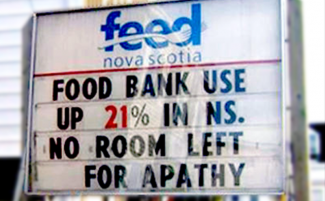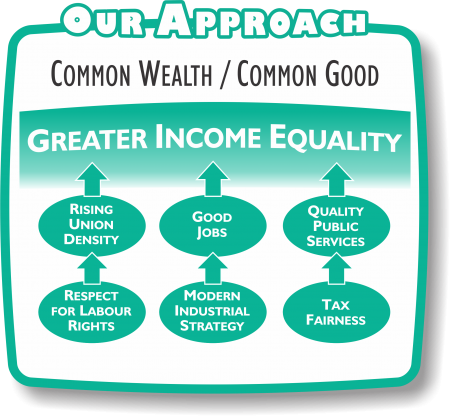HUNGER GAMES
Food banks no remedy: not for poverty, or even hunger

FOOD BANKS DON’T WORK; MONEY DOES. Yet we cling to the belief that food banks are a good way to end hunger. They aren’t. Hunger is a symptom of poverty. And no one even pretends food banks can eliminate poverty.
Valarie Tarasuk says there is clear proof money is the best remedy for hunger. Tarasuk is a driving force with PROOF, a University of Toronto interdisciplinary research team that tracks household food insecurity in Canada.
Tarasuk points out PROOF research shows a dramatic reduction in hunger once people get some money into their hands; from the Canada Child Benefit, Old Age Security (OAS) and GIS (Guaranteed Income Supplement) payments, for example. PROOF reports an examination of food insecurity among unattached, low income adults found that their risk of being food insecure is reduced by half once they reach the age of 65 and become eligible for seniors' entitlements.
Tarasuk made the point in a 2018 interview with Robert Devet of the Nova Scotia Advocate. She told him: “What is discouraging to me is the number of government initiatives that continue to fuel food banks as a response.
“Many provinces have introduced tax credits for farmers who give to food banks, back in the nineties we had these good Samaritan laws that absolved corporate donors from liabilities in terms of the health and safety of the food donated.”
“It’s concerning how we continue to busy ourselves with these little things and further entrench these responses, as if it is somehow going to do something about food insecurity.
“It’s not accountable. It’s very cheap for government to make these gestures, as opposed to revamping the welfare system, to make it so that people are no longer food insecure.”
Researchers report; "It is clear that Canada’s elected officials recognize that food insecurity is rooted in inadequate income. However, the legislation that they have passed related to food insecurity has narrowly focused on food charity."
A bag of food is no solution
“People like food banks because they let us feel like we are doing something to help,” says Nova Scotia anti-poverty activist Nestor Kuzyk. “I get it. Food bank volunteers have good hearts. Problem is it’s not enough. The hard facts show food banks are a double failure: they don’t end poverty and they don’t even feed many of our hungry.”
“The image of the problem that you get when you think about food banks is that somebody doesn’t have enough food, so we must give them food, says Tarasuk. “It feels so straightforward and immediate.
“But when we look at the research about food insecurity, we say no, this is not a small problem, and it isn’t solved by giving somebody a bag of food. We have people living in chronic conditions of deprivation that have profound implications for their health and well being. Yet what is communicated in the appeals for food bank donations is that you just have to give, and we are managing this problem.”
Food banks nobody’s first choice
A 2012 study found that about 83% of food-insecure households do not use food banks—that means about five times more food-insecure households do not use food banks than do.
In fact, the study found most food-insecure households prefer not to use a food bank when they were short of money. They would rather:
- ask friends and family for help,
- miss one or two bill payments
- ask for financial help from a local organization, or
- skip paying the rent or mortgage.
The disconnect between family hunger and food bank use exists in every province.
“Researchers have known this for a long time,” says Tarasuk. “But for ordinary people it’s startling. Food Banks Canada does its annual HungerCount. The name suggests it counts the number of people in Canada who are hungry. But it doesn’t. It counts the number of people who use food banks, a particular kind of service. The HungerCount reports don’t hide this, but the slippage occurs in the way the media reports it.”
In Nova Scotia, for example, Statistics Canada counted some 150,000 Nova Scotians as facing food insecurity at any given month in 2016. Yet HungerCount, an annual report by Food Banks Canada, shows that Nova Scotia food banks only supported an average of 24,000 individuals in March of 2016 and the same month in the previous year.
“When I look at all this research,” says Kuzyk “it’s clear the problem of hunger and poverty is even more serious than we think—something we can’t even begin to remedy with food banks.”
- 30 -













Add new comment